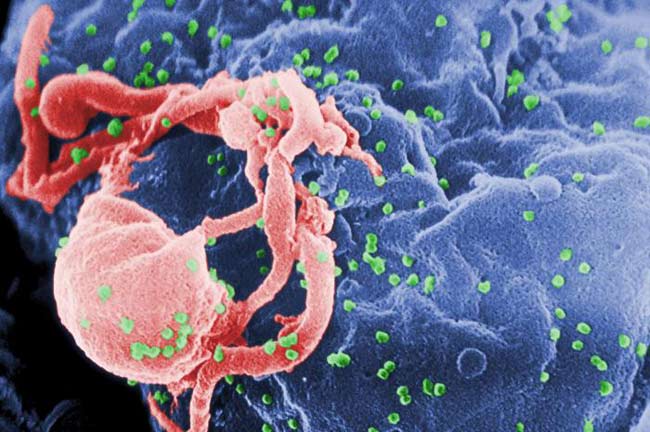Can Dating Seniors Get AIDS?

Get the world’s most fascinating discoveries delivered straight to your inbox.
You are now subscribed
Your newsletter sign-up was successful
Want to add more newsletters?

Delivered Daily
Daily Newsletter
Sign up for the latest discoveries, groundbreaking research and fascinating breakthroughs that impact you and the wider world direct to your inbox.

Once a week
Life's Little Mysteries
Feed your curiosity with an exclusive mystery every week, solved with science and delivered direct to your inbox before it's seen anywhere else.

Once a week
How It Works
Sign up to our free science & technology newsletter for your weekly fix of fascinating articles, quick quizzes, amazing images, and more

Delivered daily
Space.com Newsletter
Breaking space news, the latest updates on rocket launches, skywatching events and more!

Once a month
Watch This Space
Sign up to our monthly entertainment newsletter to keep up with all our coverage of the latest sci-fi and space movies, tv shows, games and books.

Once a week
Night Sky This Week
Discover this week's must-see night sky events, moon phases, and stunning astrophotos. Sign up for our skywatching newsletter and explore the universe with us!
Join the club
Get full access to premium articles, exclusive features and a growing list of member rewards.
This Week’s Question: I’m a 65-year-old man who is dating a 58-year-old woman. Recently, my grandson, who is rather outspoken, asked me if I was protecting myself against AIDS. At the time, I thought the question was ridiculous, but now I’m wondering.
A growing number of older people have HIV/AIDS. About 19 percent of all people with HIV/AIDS in this country now are over age 50. New AIDS cases have risen faster in the over-50 population than in people under 40.
Since the early 80's, HIV in people over 50 accounted for about 10 percent of all cases. However, the method of transmission has changed. Blood transfusion was once the major transmission mode. Now, heterosexual contact and IV drug use are the main causes of HIV infection in seniors.
Heterosexual transmission in men over 50 is up 94 percent, and 107 percent in women since 1991.
But there may even be many more cases, because doctors do not always test older people for HIV/AIDS during routine exams, and older people often mistake signs of HIV/AIDS for the aches of normal aging so they don’t get medical attention.
The number of HIV/AIDS cases among older people is growing every year because older Americans know less about HIV/AIDS than younger people, healthcare professionals often do not talk with older people about prevention, older people are less likely than younger people to talk about their sex lives or drug use with their doctors.
HIV (human immunodeficiency virus) is a virus that damages the immune system. This makes you vulnerable to diseases, infections, and cancers. When that happens, you have AIDS (acquired immunodeficiency syndrome), which is the last stage of HIV infection.
Get the world’s most fascinating discoveries delivered straight to your inbox.
HIV symptoms include headache, cough, diarrhea, swollen glands, lack of energy, loss of appetite and weight loss, fevers and sweats, repeated yeast infections, skin rashes, pelvic and abdominal cramps, sores and short-term memory loss.
Your health care provider can test your blood for HIV/AIDS. You can also test your blood at home with the “Home Access Express HIV-1 Test System” that you can buy at your drug store. It is the only HIV home test system approved by the Food and Drug Administration and sold legally in the United States.
Anyone can get HIV and AIDS. HIV usually comes from having unprotected sex or sharing needles with an infected person, or through contact with HIV-infected blood.
You can not get HIV from: casual contact such as shaking hands with someone who has HIV/AIDS; using a public telephone, drinking fountain, restroom, swimming pool, hot tub; sharing a drink; being coughed or sneezed on by a person with HIV/AIDS; giving blood, and a mosquito bite.
You may be at risk if you do not use condoms, you do not know your partner’s drug and sexual history, you have had a blood transfusion or operation in a developing country, you had a blood transfusion in the United States between 1978 and 1985.
There is no cure for HIV/AIDS. But if you become infected, there are drugs that help keep the HIV virus in check and slow the spread of HIV in the body. Doctors are now using a combination of drugs called HAART (highly active antiretroviral therapy) to treat HIV/AIDS. Although it is not a cure, HAART is greatly reducing the number of deaths from AIDS in this country
- Video: AIDS Was Here Earlier
- Top 10 Mysterious Diseases
- More About AIDS and HIV
The Healthy Geezer column publishes each Monday on LiveScience. If you would like to ask a question, please write fred@healthygeezer.com. © 2010 by Fred Cicetti.
 Live Science Plus
Live Science Plus










